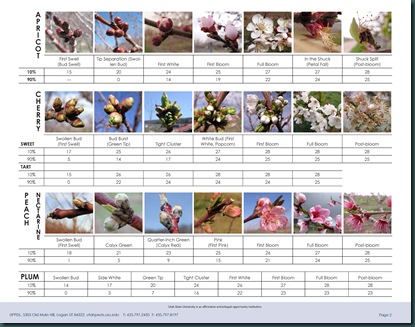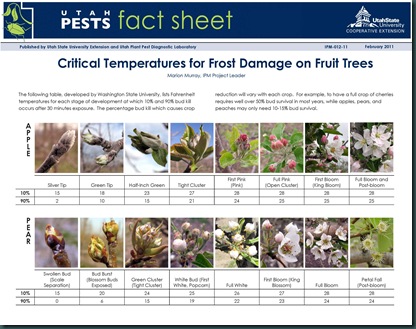It's
time once again to revisit the critical temperatures that can cause
frost damage to fruit trees, specifically apple trees. We are currently
at tight cluster to pink here in northern Illinois with a weekend that gave us temperatures in the upper 20's and about 6" of snow. Fortunately, our lowest recorded temperature was 28.7 degrees, 7/10 of a degree above the damage lever! This spring has marked another unprecedented weather
pattern that raised
our temperatures in late March and early April and dropped our
temperatures in late April to
way below normal. The early warm temperatures accelerated leaf tissue growth, and the lower temperatures that are anticipated present the threat of frost during bloom. It seems that each
spring since 2012, we have been on the
verge of critical temperatures for frost damage with our fruit trees.
 |
| The dark brown center of this apple flower indicates it was killed by a freeze. (Photo credit: Mark Longstroth, MSU Extension) |
 |
| (Click on the photos to download the chart in PDF format.) |
Given
the weather patterns we have experienced so far this spring a spring
frost could
still be possible. Once the fruit has set, then the critical temperatures
that can damage the fruit become lower. We will need to constantly
assess the stage of development our trees are at over the next weeks and
their
susceptibility to possible freeze injury.
If we continue in this spell of colder weather, apple trees will continue to develop more slowly, but once they begin showing tight cluster, pink and bloom, the critical temperature rises from the low 20’s to the high 20s, to levels just below freezing at bloom time, which is where we are now.
If we continue in this spell of colder weather, apple trees will continue to develop more slowly, but once they begin showing tight cluster, pink and bloom, the critical temperature rises from the low 20’s to the high 20s, to levels just below freezing at bloom time, which is where we are now.


No comments:
Post a Comment
Comments are welcome! All comments are moderated, so you will see your comment posted here as soon as we have reviewed it! Questions are best asked via email for a quicker response. Address your questions to service@royaloakfarmorchard.com.
Note: Only a member of this blog may post a comment.